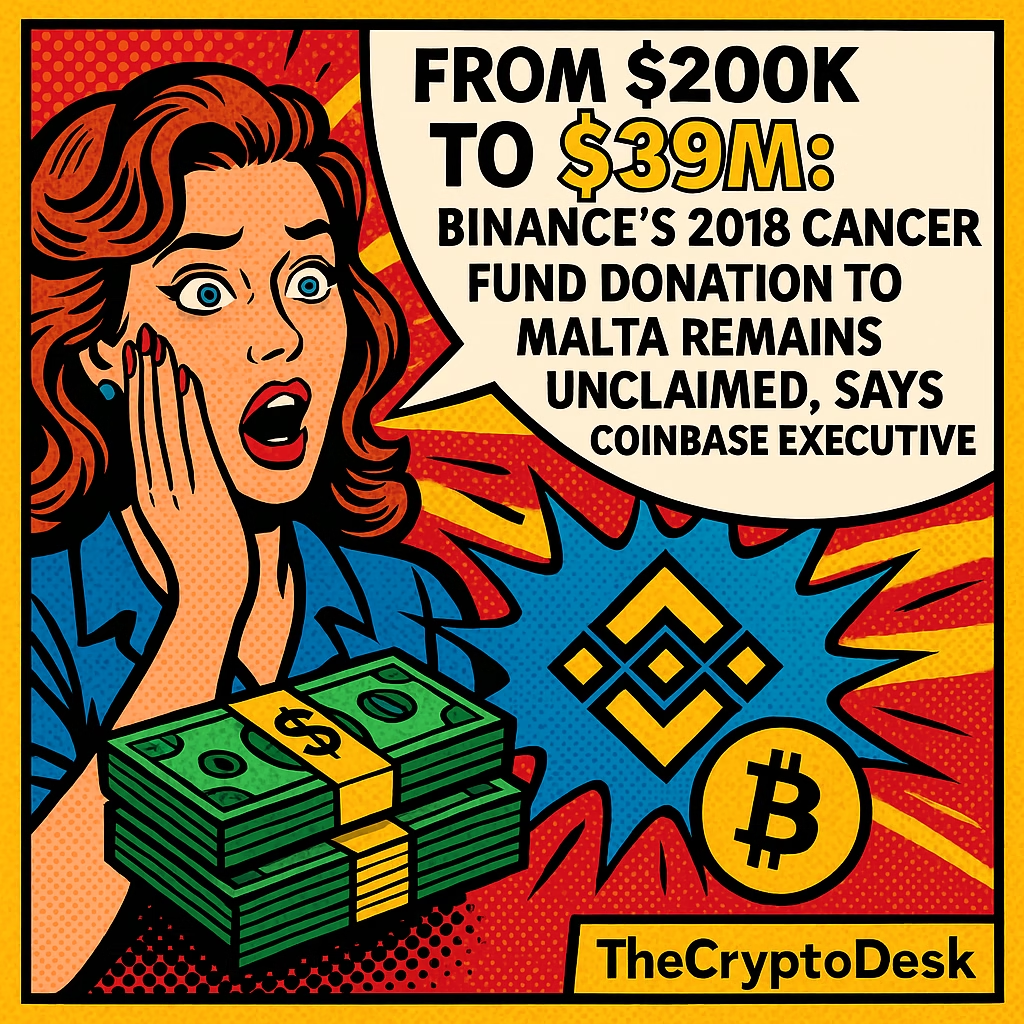In a stunning twist that has captured the attention of the cryptocurrency community, Conor Grogan, a prominent executive at Coinbase, has brought to light a significant piece of news regarding a donation made back in 2018. A generous contribution of $200,000 in Binance Coin (BNB) from Binance and various crypto enthusiasts to Malta’s terminal cancer fund has remained firmly unclaimed and untouched. Today, that donation has appreciated spectacularly, ballooning in value to an astonishing $39 million. Grogan has now called upon the Maltese citizens to notify their government about this available fund that could substantially aid the healthcare system, stating, “The proceeds could cover the full salaries of needed medical specialists.”
The last notable update regarding this donation dates back to 2021, when a lawsuit concerning the funds was dropped after the money was successfully located. Grogan took to Twitter to share this eye-opening revelation, urging Maltesers to take action in accessing these funds for a vital cause. “Any Malta citizens, please let your government know that these funds are accessible,” he encouraged in his tweet.
In 2018, Binance and crypto users donated $200,000 in BNB to Malta Terminal Cancer Patients. The funds were never withdrawn and remain untouched, now worth $39M due to the appreciation of BNB! Any Malta citizens, please let your government know that these funds are accessible pic.twitter.com/jRqLz7vy4M— Conor (@jconorgrogan) October 13, 2025
This hefty donation was pledged during a time when Malta was positioning itself as the “Blockchain Island,” attracting a flurry of blockchain startups and cryptocurrency businesses with its favorable regulatory environment. Binance, the world’s largest crypto exchange, had promised this generous contribution via its charitable arm, the Blockchain Charity Foundation, with more benevolent donations flowing in over the years aimed at assisting individuals battling cancer and living with disabilities. Notably, the total pledged in support of these initiatives surged to over $8 million by 2021, as the values of cryptocurrencies soared.
However, the journey to get those funds into the right hands has not been straightforward. In November 2020, a lawsuit was brought forth by the Malta Community Chest Fund against Binance. The fund accused the exchange of attempting to withdraw from its donation commitments and relocating assets to the U.S. to sidestep Maltese jurisdiction. Legal representatives of Binance claimed that the foundation was transitioning to avoid substantial administrative overhead since a similar entity existed in the U.S.
The situation escalated when the Office of the Commissioner for Voluntary Organizations threatened legal repercussions in mid-2021 due to Binance’s failure to file annual returns for the years 2018 through 2020. However, a few days later, those accounts were located in an electronic folder, and the threat was lifted as a resolution to the donation dispute began to take shape. Nevertheless, the substantial funds have remained dormant since, awaiting action.
To add to the conversation, Grogan also uncovered an astounding $38 million in unclaimed disaster relief funds designated for victims in West Japan. Alarmingly, while around $1.4 million was originally donated in 2018, approximately half has been withdrawn, yet the remaining funds have multiplied in value by over 50 times. Grogan expressed hope that this newfound attention to such funds could lead to their eventual utilization for meaningful causes.
The backdrop of this revelation is particularly engaging, especially as Binance continues its legacy of philanthropy under the leadership of CEO Richard Teng and co-founder Changpeng Zhao (CZ). Just this past April, CZ pledged 1,000 BNB, valued around $598,025, to assist Myanmar and Thailand in recovering from a significant earthquake. Furthermore, Binance Charity took it a step further by launching a $1.5 million BNB airdrop for those affected, distributing funds diligently to verified users based on KYC protocols.
In August, Binance Charity announced another relief initiative worth up to $1.2 million in BNB for users reeling from devastating floods in southern Taiwan. The charity’s efforts have demonstrated a consistent commitment to humanitarian assistance in the region, extending support to earthquake casualties across various countries, including Turkey and Argentina.
🏛️ France has urged the European Union to give ESMA direct authority over major cryptocurrency firms operating across the bloc. #ESMA #EU https://t.co/V98VhQzUDi— Cryptonews.com (@cryptonews) October 9, 2025
Amid these developments, Malta is experiencing its own regulatory challenges. The nation is currently reacting to proposals from France, Italy, and Austria aimed at expanding the European Securities and Markets Authority’s (ESMA) powers, which would facilitate direct oversight of major crypto firms throughout the EU. The Malta Financial Services Authority has voiced its opposition to centralized control, arguing that such measures would only lead to inefficiencies.
The discussions surrounding this unclaimed donation bring to light not only the potential benefits it could provide to Malta’s healthcare infrastructure but also highlight the fascinating interplay between regulations and philanthropic efforts within the global crypto landscape. As both the community and its leaders navigate these complex waters, the question remains: What will it take for the Maltese government to act on these available funds and ensure they support those in dire need?
In conclusion, the immense value embedded in these forgotten donations presents not just a financial opportunity but a chance to heal and uplift communities grappling with significant challenges. By mobilizing the knowledge of this situation and applying pressure for action, advocates hope to see these funds finally put to good use. Will this revelation mark the beginning of a new chapter in charitable endeavors within the cryptocurrency realm? Your opinion matters—join the discussion!
